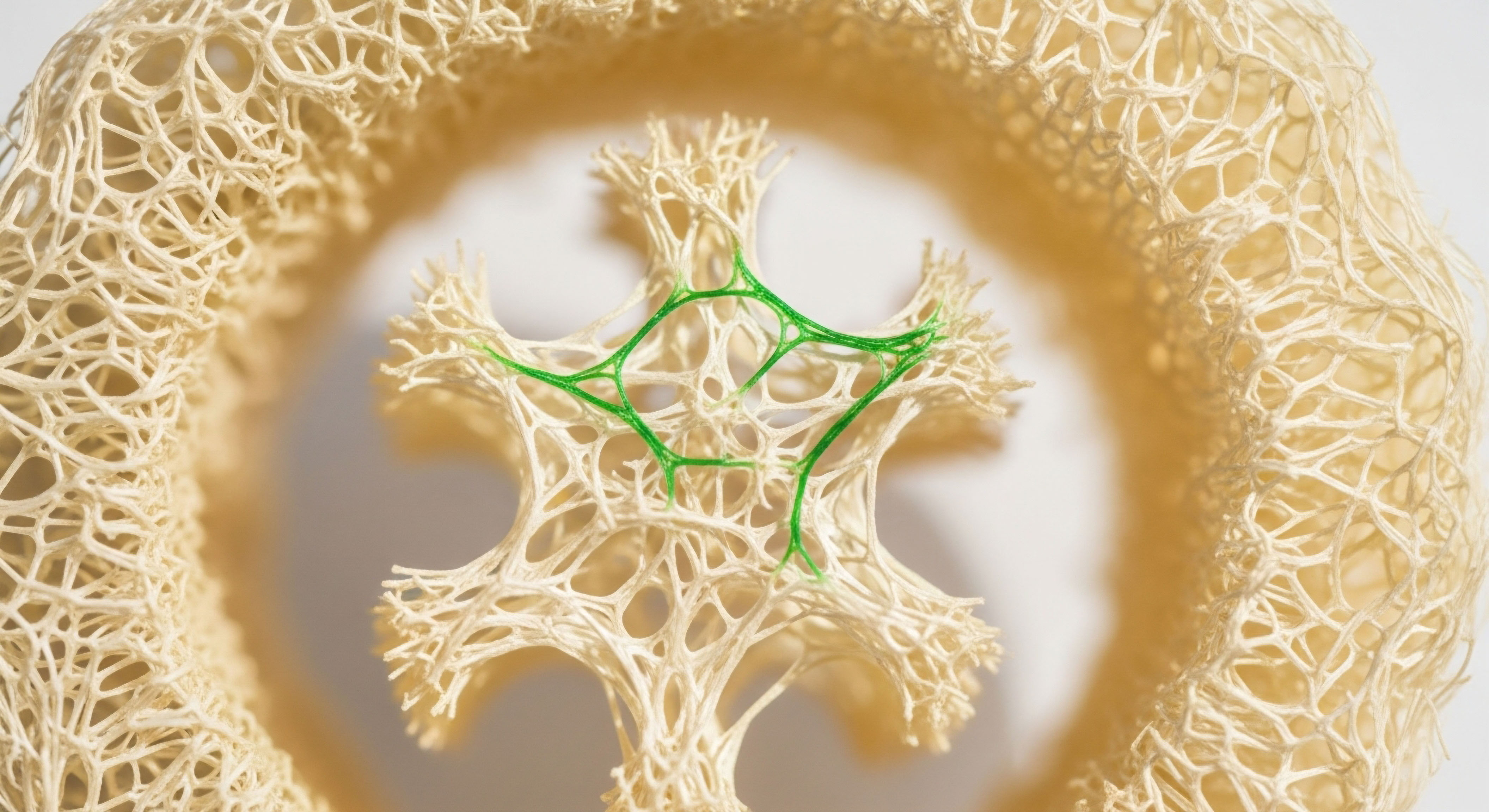

Fundamentals
You feel it in your bones, that deep, persistent fatigue that coffee can no longer touch. It is a pervasive sense of running on empty, a feeling that your body’s internal rhythms are out of sync. This experience, far from being a simple matter of tiredness, is often the first whisper from your endocrine system that something is profoundly amiss.
The intricate network of glands and hormones that orchestrates your energy, mood, and metabolism is exquisitely sensitive to the quality and quantity of your sleep. When rest becomes a debt that is never fully repaid, the consequences ripple through your entire biology, setting the stage for long-term changes that can redefine your health.
Understanding the connection begins with recognizing that sleep is an active, vital process for hormonal regulation. During the deep stages of sleep, your body is hard at work, performing critical maintenance that includes producing and balancing key hormones. Think of it as a nightly recalibration of your body’s master control system.
The pituitary gland, a pea-sized structure at the base of the brain, releases pulses of growth hormone, which is essential for tissue repair and cellular regeneration. Simultaneously, the production of cortisol, the primary stress hormone, is suppressed, allowing your body to enter a state of recovery. This delicate dance ensures that you wake up not just rested, but physiologically reset.
When sleep is consistently cut short, this entire process is thrown into disarray. The nightly dip in cortisol may fail to occur, leading to elevated levels of this stress hormone throughout the day. This chronic elevation can create a state of sustained “fight or flight,” impacting everything from your immune response to your ability to think clearly.
The release of growth hormone Meaning ∞ Growth hormone, or somatotropin, is a peptide hormone synthesized by the anterior pituitary gland, essential for stimulating cellular reproduction, regeneration, and somatic growth. is blunted, impairing your body’s ability to repair itself overnight. The very architecture of your hormonal world begins to shift, moving from a state of balance to one of chronic stress and dysfunction. This is the initial, foundational consequence of unaddressed sleep-related hormonal imbalances, a subtle yet persistent disruption that can have far-reaching effects on your overall well-being.
Persistent sleep loss fundamentally alters the body’s ability to regulate its hormonal environment, initiating a cascade of metabolic and physiological disruptions.

The Symphony of Hunger Hormones
One of the most immediate and tangible consequences of poor sleep is the disruption of the hormones that regulate appetite. You may have noticed that after a night of tossing and turning, you crave sugary or high-carbohydrate foods. This is a direct result of changes in two key hormones ∞ ghrelin Meaning ∞ Ghrelin is a peptide hormone primarily produced by specialized stomach cells, often called the “hunger hormone” due to its orexigenic effects. and leptin.
Ghrelin, often called the “hunger hormone,” is produced in the stomach and signals to your brain that it’s time to eat. Leptin, on the other hand, is produced by fat cells and signals satiety, telling your brain that you’re full.
Sleep deprivation creates a perfect storm for weight gain by altering the balance of these two hormones. Studies have shown that even a few nights of inadequate sleep can cause ghrelin levels to rise and leptin Meaning ∞ Leptin is a peptide hormone secreted primarily by adipocytes, signaling the brain about long-term energy stores. levels to fall. This creates a powerful biological drive to consume more calories, even when your body doesn’t physically need them.
The result is a persistent feeling of hunger and a diminished sense of fullness, a combination that makes it incredibly difficult to maintain a healthy weight. This hormonal disruption is a key reason why chronic sleep loss Meaning ∞ A state characterized by consistent, inadequate duration or quality of sleep, persisting over an extended timeframe, typically weeks to months, leading to physiological and cognitive impairments. is so strongly linked to an increased risk of obesity.

Impact on Thyroid Function
The thyroid gland, located in the neck, produces hormones that regulate your metabolism, the rate at which your body converts food into energy. The production of thyroid hormone is controlled by thyroid-stimulating hormone (TSH), which is released by the pituitary gland. The release of TSH follows a distinct circadian rhythm, with levels peaking during the night.
Chronic sleep deprivation Meaning ∞ Sleep deprivation refers to a state of insufficient quantity or quality of sleep, preventing the body and mind from obtaining adequate rest for optimal physiological and cognitive functioning. can significantly dampen this nocturnal TSH surge, leading to a decrease in overall thyroid hormone production. This can result in a slowing of your metabolism, a condition known as hypothyroidism. Symptoms of an underactive thyroid include fatigue, weight gain, cold intolerance, and brain fog, many of which overlap with the symptoms of sleep deprivation itself. This creates a vicious cycle in which poor sleep contributes to thyroid dysfunction, which in turn exacerbates feelings of fatigue and lethargy.


Intermediate
Moving beyond the foundational understanding of sleep’s role in hormonal health, we can begin to examine the specific clinical consequences of chronic sleep debt. When the body is persistently deprived of adequate rest, the resulting hormonal imbalances are not merely transient fluctuations. They become ingrained patterns of dysfunction that can precipitate serious, long-term health conditions.
The body’s intricate feedback loops, designed to maintain a stable internal environment, begin to fail. This leads to a state of allostatic overload, where the cumulative wear and tear from chronic stress begins to take its toll on multiple organ systems.
One of the most well-documented consequences of this process is the development of insulin resistance. Insulin, a hormone produced by the pancreas, is responsible for helping your cells absorb glucose from the bloodstream to be used for energy. Chronic sleep deprivation impairs Reducing inflammatory load via diet, sleep, and exercise is key to maximizing peptide therapy effectiveness. the body’s sensitivity to insulin, meaning that your cells become less responsive to its effects.
This forces the pancreas to work harder, producing more and more insulin to try and keep blood sugar levels in check. Over time, this can lead to persistently high blood sugar levels, a hallmark of prediabetes and type 2 diabetes. This is a direct, measurable consequence of the body’s inability to properly regulate its hormonal systems in the face of inadequate sleep.
Chronic sleep deprivation drives the development of insulin resistance, a critical step on the path toward metabolic syndrome and type 2 diabetes.

The HPA Axis and Cortisol Dysregulation
The hypothalamic-pituitary-adrenal (HPA) axis is the body’s central stress response system. It is a complex network of interactions between the hypothalamus, the pituitary gland, and the adrenal glands, which are responsible for producing cortisol. In a healthy individual, cortisol levels Meaning ∞ Cortisol levels refer to the quantifiable concentration of cortisol, a primary glucocorticoid hormone, circulating within the bloodstream. follow a predictable diurnal rhythm, peaking in the morning to promote wakefulness and gradually declining throughout the day to their lowest point at night.
Chronic sleep deprivation disrupts this rhythm, leading to a flattening of the cortisol curve. This means that cortisol levels may be lower than normal in the morning, contributing to feelings of fatigue and grogginess, and higher than normal in the evening, interfering with the ability to fall asleep.
This state of cortisol dysregulation Meaning ∞ Cortisol dysregulation refers to an atypical pattern or inappropriate secretion of cortisol, the primary glucocorticoid hormone produced by the adrenal glands, deviating from its normal physiological rhythm and concentration in response to internal or external stimuli. has profound implications for overall health. Persistently elevated cortisol levels can suppress the immune system, increase inflammation, and contribute to the breakdown of muscle tissue. It can also impair cognitive function, affecting memory and executive function.

How Does Sleep Deprivation Affect Sex Hormones?
The hormonal consequences of poor sleep extend to the reproductive system as well. In men, the majority of testosterone Meaning ∞ Testosterone is a crucial steroid hormone belonging to the androgen class, primarily synthesized in the Leydig cells of the testes in males and in smaller quantities by the ovaries and adrenal glands in females. production occurs during sleep. Chronic sleep deprivation Chronic sleep deprivation disrupts male hormonal balance, reducing testosterone and impairing reproductive function, demanding systemic wellness recalibration. can significantly reduce testosterone levels, leading to a range of symptoms that are often associated with andropause, or “low T.” These can include low libido, erectile dysfunction, fatigue, and a decrease in muscle mass.
The impact is so significant that some studies have shown that one week of sleep restriction Meaning ∞ Sleep Restriction is a targeted behavioral intervention for insomnia, precisely limiting the time an individual spends in bed to the actual duration they are asleep, aiming to consolidate fragmented sleep and improve sleep efficiency. can lower testosterone levels by an amount equivalent to 10 to 15 years of aging.
In women, the relationship between sleep and hormones is more complex, as it is influenced by the menstrual cycle and menopausal status. However, it is clear that sleep deprivation can disrupt the delicate balance of estrogen and progesterone, leading to irregular menstrual cycles, worsening of premenstrual syndrome (PMS) symptoms, and a more difficult transition into menopause.
For women in the perimenopausal and postmenopausal stages, poor sleep can exacerbate symptoms like hot flashes and night sweats, creating a challenging feedback loop in which hormonal changes disrupt sleep, and poor sleep worsens hormonal symptoms.
| Hormone | Function | Effect of Sleep Deprivation |
|---|---|---|
| Cortisol | Stress response, metabolism | Elevated evening levels, disrupted rhythm |
| Insulin | Glucose regulation | Decreased sensitivity, increased resistance |
| Leptin | Satiety signal | Decreased levels, leading to increased hunger |
| Ghrelin | Hunger signal | Increased levels, stimulating appetite |
| Growth Hormone | Tissue repair, growth | Suppressed release, impairing recovery |
| Testosterone | Male reproductive health, muscle mass | Reduced levels, particularly in men |


Academic
From a systems biology perspective, the long-term consequences of unaddressed sleep-related hormonal imbalances can be understood as a progressive failure of allostasis. Allostasis is the process by which the body maintains stability through physiological change.
When faced with a stressor, such as sleep deprivation, the body initiates a cascade of adaptive responses, primarily mediated by the HPA axis Meaning ∞ The HPA Axis, or Hypothalamic-Pituitary-Adrenal Axis, is a fundamental neuroendocrine system orchestrating the body’s adaptive responses to stressors. and the sympathetic nervous system. In the short term, these responses are protective. However, when the stressor becomes chronic, the persistent activation of these systems leads to allostatic overload, a state of cumulative physiological wear and tear that ultimately results in disease.
The neuroendocrine mechanisms underlying this process are complex and multifaceted. Chronic sleep restriction leads Chronic caloric restriction triggers a survival response that suppresses reproductive and thyroid hormones to conserve energy. to a persistent increase in sympathetic nervous system activity, as evidenced by elevated levels of circulating catecholamines like norepinephrine. This sustained sympathetic tone contributes to the development of hypertension and cardiovascular disease.
At the same time, the dysregulation of the HPA axis, characterized by the flattening of the diurnal cortisol rhythm, has profound implications for glucose metabolism. Elevated evening cortisol levels promote gluconeogenesis in the liver and increase insulin resistance Meaning ∞ Insulin resistance describes a physiological state where target cells, primarily in muscle, fat, and liver, respond poorly to insulin. in peripheral tissues, creating a metabolic environment that is highly conducive to the development of type 2 diabetes.
The state of chronic allostatic overload induced by sleep loss drives a systemic inflammatory response, accelerating cellular aging and increasing vulnerability to chronic disease.

The Role of Inflammation and Cellular Senescence
A growing body of research indicates that chronic sleep deprivation promotes a state of low-grade systemic inflammation. This is mediated, in part, by the overproduction of pro-inflammatory cytokines, such as interleukin-6 (IL-6) and tumor necrosis factor-alpha (TNF-α).
These inflammatory molecules are known to play a key role in the pathogenesis of a wide range of age-related diseases, including cardiovascular disease, neurodegenerative disorders, and certain types of cancer. The link between sleep loss, inflammation, and disease is a critical area of ongoing research, with significant implications for public health.
Furthermore, recent studies have begun to explore the connection between sleep deprivation and cellular senescence, the process by which cells lose their ability to divide and function properly. Telomeres, the protective caps on the ends of our chromosomes, shorten with each cell division, and their length is considered a biomarker of biological aging.
Chronic sleep deprivation has been associated with accelerated telomere shortening, suggesting that it may hasten the aging process at a cellular level. This provides a compelling molecular mechanism to explain the observation that chronic sleep loss can mimic many of the hallmarks of aging.

What Are the Implications for Neurodegeneration?
The brain is particularly vulnerable to the consequences of sleep deprivation. During sleep, the brain’s glymphatic system is highly active, clearing away metabolic waste products that accumulate during wakefulness. One of these waste products is beta-amyloid, a protein that is known to form toxic plaques in the brains of individuals with Alzheimer’s disease.
Chronic sleep deprivation impairs the clearance of beta-amyloid, potentially increasing the risk of developing this devastating neurodegenerative condition. The combination of increased inflammation, HPA axis dysregulation, and impaired waste clearance creates a “perfect storm” for accelerated brain aging and an increased risk of cognitive decline.
- Hypothalamic-Pituitary-Gonadal (HPG) Axis ∞ The intricate communication network that governs reproductive function. In men, sleep deprivation directly suppresses the nocturnal luteinizing hormone (LH) pulse, which is the primary driver of testosterone synthesis in the testes. In women, the disruption is more complex, affecting the pulsatile release of gonadotropin-releasing hormone (GnRH) and altering the delicate interplay of hormones that regulate the menstrual cycle.
- Somatotropic Axis ∞ This axis regulates growth and metabolism through the release of growth hormone (GH) from the pituitary gland. The vast majority of GH secretion occurs during slow-wave sleep. Consequently, any condition that fragments or reduces deep sleep, such as chronic sleep restriction, leads to a significant reduction in GH levels. This impairs the body’s capacity for tissue repair, lean muscle maintenance, and optimal metabolic function.
- Thyrotropic Axis ∞ The system controlling thyroid function. Sleep loss has been shown to blunt the normal nocturnal rise in thyroid-stimulating hormone (TSH). This can lead to a subclinical hypothyroid state, characterized by reduced metabolic rate, fatigue, and cognitive slowing, further compounding the direct effects of sleep deprivation itself.
| System/Axis | Key Hormones | Observed Long-Term Consequences |
|---|---|---|
| HPA Axis | Cortisol, CRH, ACTH | Flattened diurnal cortisol rhythm, increased allostatic load, insulin resistance |
| Sympathetic Nervous System | Norepinephrine, Epinephrine | Increased sympathetic tone, hypertension, cardiovascular risk |
| Appetite Regulation | Leptin, Ghrelin | Persistent hyperphagia, increased risk of obesity and metabolic syndrome |
| Glymphatic System | N/A (Waste Clearance) | Impaired clearance of neurotoxins (e.g. beta-amyloid), increased risk of neurodegeneration |

References
- Spiegel, Karine, et al. “Brief communication ∞ Sleep curtailment in healthy young men is associated with decreased leptin levels, elevated ghrelin levels, and increased hunger and appetite.” Annals of internal medicine 141.11 (2004) ∞ 846-850.
- Spiegel, Karine, Rachel Leproult, and Eve Van Cauter. “Impact of sleep debt on metabolic and endocrine function.” The Lancet 354.9188 (1999) ∞ 1435-1439.
- Mullington, Janet M. et al. “Sleep loss and inflammation.” Best practice & research Clinical endocrinology & metabolism 24.5 (2010) ∞ 775-784.
- Leproult, Rachel, and Eve Van Cauter. “Effect of 1 week of sleep restriction on testosterone levels in young healthy men.” JAMA 305.21 (2011) ∞ 2173-2174.
- Van Cauter, Eve, Karine Spiegel, and Rachel Leproult. “The impact of sleep deprivation on hormones and metabolism.” Medscape education (2005).

Reflection
The information presented here offers a clinical map, connecting the subjective experience of fatigue to the objective reality of physiological change. It is a starting point for a deeper inquiry into your own health. The symptoms you may be experiencing are valid, and they are rooted in the intricate biology of your body.
Consider this knowledge not as a diagnosis, but as a lens through which to view your own well-being. The path toward restoring balance is a personal one, and it begins with understanding the profound connection between rest and vitality. What is your body trying to tell you in the quiet hours of the night?











